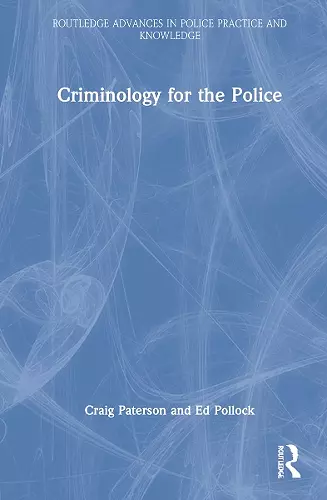Criminology for the Police
Craig Paterson author Ed Pollock author
Format:Hardback
Publisher:Taylor & Francis Ltd
Published:3rd May '22
Currently unavailable, and unfortunately no date known when it will be back
This hardback is available in another edition too:
- Paperback£37.99(9780367532307)

This book offers an applied approach to criminology suitable for prospective police officers. It covers the fundamentals of criminological knowledge, theory and research, and their relevance to policing. The book is split into two parts, the first introducing the basics of criminology, and the second connecting criminological research to police practice. It focuses on the principles of evidence-based practice and encourages students to think critically about the issues covered. Core content includes the following:
- A history of policing in England and Wales, through a criminological lens.
- An overview of the literature on police culture, bias and discretion.
- A review of the challenges of applying criminological insights to policing, and the impact of the College of Policing code of ethics on police practice.
- An exploration of the challenges of contemporary policing, including complex crime, transnational investigation, digital and organised crime.
- A critical overview of evidence, and public sources of evidence.
- An examination of the contested definitions and perspectives on Evidence-Based Policing.
- An introduction to criminological research, including quantitative, qualitative and mixed methods.
- A review of problem solving in policing, including SARA and Atlas models.
This book is essential reading for all students studying degrees in Professional Policing, as well as students of criminology engaged in criminal justice knowledge and practice.
The delivery of policing in any democratic society presents a critical test of those democratic systems and civic institutions that seek to provide security for citizens and to protect those who are vulnerable or marginalised. Criminology for the Police is the first book to interrogate this enduring tension and competing interpretations of the relationship between crime and policing in the context of the College of Policing’s Police Education Qualifications Framework. The book introduces key ideas and concepts that underpin our understanding of crime as well as the design and delivery of twenty-first century policing and assesses their implications for those tasked with front-line policing. The book also outlines the growing importance of data and knowledge generation to the contemporary policing landscape and introduces readers to the basic skills required to use research and data to understand dynamic and complex challenges and improve the delivery of policing.
Baroness Helena Kennedy
The relationship between academic and policing is not new, but the introduction of the PEQF is a game changer and thousands of new recruits into the police are already finding themselves engaged in academic studies of policing that they might not have expected to be part of their role. This book helps these officers navigate their way through various theories and concepts by drawing out the different ways in which criminology informs our understanding of policing. Importantly, the authors remind us that criminology encompasses a diverse range of perspectives, and they focus on making the appropriate links between different criminological voices and the relevant aspects of policing.
Dominic Wood Head of the School of Law, Policing and Social Sciences at Canterbury Christchurch University
'The delivery of policing in any democratic society presents a critical test of those democratic systems and civic institutions that seek to provide security for citizens and to protect those who are vulnerable or marginalised. Criminology for the Police is the first book to interrogate this enduring tension and competing interpretations of the relationship between crime and policing in the context of the College of Policing’s Police Education Qualifications Framework. The book introduces key ideas and concepts that underpin our understanding of crime as well as the design and delivery of twenty-first century policing and assesses their implications for those tasked with front-line policing. The book also outlines the growing importance of data and knowledge generation to the contemporary policing landscape and introduces readers to the basic skills required to use research and data to understand dynamic and complex challenges and improve the delivery of policing.'
Baroness Helena Kennedy
'The relationship between academic and policing is not new, but the introduction of the PEQF is a game changer and thousands of new recruits into the police are already finding themselves engaged in academic studies of policing that they might not have expected to be part of their role. This book helps these officers navigate their way through various theories and concepts by drawing out the different ways in which criminology informs our understanding of policing. Importantly, the authors remind us that criminology encompasses a diverse range of perspectives, and they focus on making the appropriate links between different criminological voices and the relevant aspects of policing.'
Dominic Wood Head of the School of Law, Policing and Social Sciences at Canterbury Christchurch University
ISBN: 9780367532291
Dimensions: unknown
Weight: 453g
202 pages